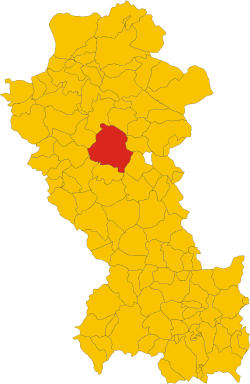Potenza
| Potenza | ||
|---|---|---|
| Comune | ||
| Città di Potenza | ||

Panorama of Potenza
|
||
|
||
 Potenza within the Province of Potenza |
||
| Location of Potenza in Italy | ||
| Coordinates: 40°38′N 15°48′E / 40.633°N 15.800°ECoordinates: 40°38′N 15°48′E / 40.633°N 15.800°E | ||
| Country | Italy | |
| Region | Basilicata | |
| Province / Metropolitan city | Potenza (PZ) | |
| Government | ||
| • Mayor | Dario De Luca (FDI-AN) | |
| Area | ||
| • Total | 173 km2 (67 sq mi) | |
| Elevation | 819 m (2,687 ft) | |
| Population (31 May 2015) | ||
| • Total | 67,348 | |
| • Density | 390/km2 (1,000/sq mi) | |
| Demonym(s) | Potentini | |
| Time zone | CET (UTC+1) | |
| • Summer (DST) | CEST (UTC+2) | |
| Postal code | 85100 | |
| Dialing code | 0971 | |
| Patron saint | St. Gerard | |
| Saint day | May 30 | |
| Website | Official website | |
Potenza (Italian: [poˈtɛntsa], Neapolitan: Putènza, Potentino dialect: Putenz) is a city and comune in the Southern Italian region of Basilicata (former Lucania). It is the capital of the province of Potenza and the Basilicata region.
The city is the highest regional capital and one of the highest provincial capitals in Italy, overlooking the valley of the Basento river in the Apennine Mountains of Lucania, east of Salerno. Its territory is bounded by the comuni of Anzi, Avigliano, Brindisi Montagna, Picerno, Pietragalla, Pignola, Ruoti, Tito, and Vaglio Basilicata.
The first settlement of Potentia was probably located at a lower elevation than at present, some 10 kilometres (6 miles) south of today's Potenza.
The Lucani of Potenza sided against Rome's enemies during the latter's wars against the Samnites and the Bruttii. Subjugated during the 4th century BC (later gaining the status of municipium), the Potentini rebelled after the Roman defeat at Cannae in 216 BC. However, the Battle of the Metaurus marked the end of any Carthaginian aspirations in Italy, and Potentia was reconquered by the Romans and reduced to the status of military colony.
...
Wikipedia


